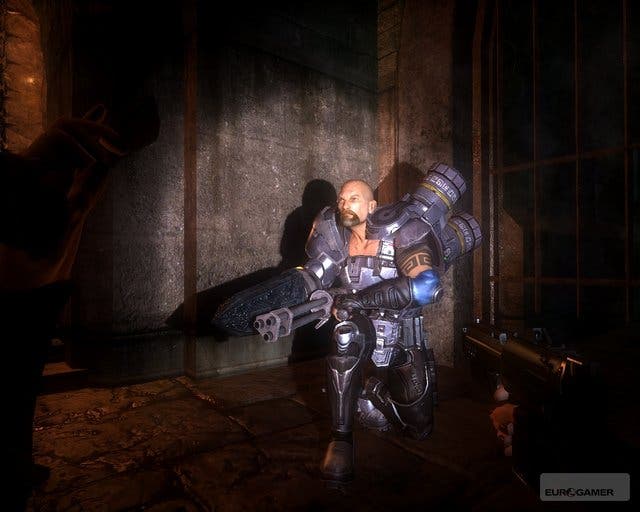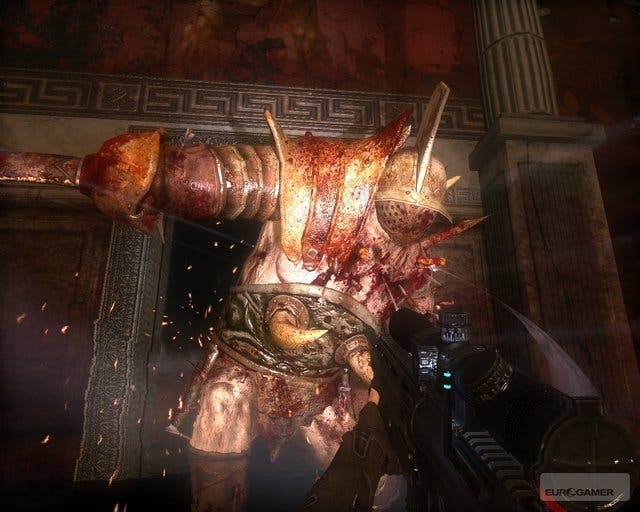Clive Barker's Jericho
Knee deep in the dead.
One thing Jericho is absolutely rubbish at is giving you any kind of useful advice, and with no tutorial included, and no expectation of the kind of gameplay scenarios you're going to face, it's one of those games where you'll very much learn about as you go along. In a sense, this becomes part of its charm in retrospect, but while you're repeatedly being slaughtered and cursing the rather inconsiderate checkpointing, all you can think about is 'why am I so rubbish at this game?'. Admittedly, playing it on hard was partially the reason for so many deaths, but the way the Achievement points are distributed, Jericho doesn't give you much choice but to do so.
While it might seem as if all your problems are down to being some kind of gaming masochism, the truth is that you just have to get good at knowing when best to use everyone's speciality, and get good at making the most of them. In particular, Black's 'Ghost Bullet' ability became our staple tactic for most of the game, continually popping heads three at a time and cutting a swathe through what would have otherwise been difficulty and protracted encounters.
As if pre-empting gamers' tendencies to rely on doing the same thing over and over, a few plot twists here and there ensure that your numbers are reduced, forcing you into using dramatically different tactics to survive, and, better still, forcing you to go it alone and really fight for your life. Not only does this give you a much broader impression of what the game has to offer, by forcing you to learn each character's hidden depths it helps encourage you to change your approach as and when it's required. The chances are, by the time you really need to use a specific character, you'll already be proficient in how they operate, and how best to utilise their speciality.
Firstborn, last to die

But as admirable as this constant need to adjust your playing style is, it can't quite paper over the cracks in some of the weaker elements of the game design. For a start, your team-mates aren't anywhere near as savvy as you are when it comes to utilising your special abilities, and tend to get incapacitated an awful lot. To make up for this rather annoying habit, the developers basically 'fixed' this tendency by giving you the ability to just walk up to anyone out for the count and heal them. Likewise, when your currently selected character dies, you end up switching to someone else, running over to your prostrate body, healing, then switching back. It might make sense in terms of the 'rules' of the character's abilities, but in gameplay terms it becomes a bit of a clumsy way of making sure you're not heading back to the load screen too much. At its most frantic, you end up running around like a headless chicken healing, healing, healing with so many of your AI buddies getting killed literally seconds after being revived it's a bit of a joke. So many times, you'll scrape by, not actually fighting, but just making damn sure that there are other people in the scene so that if you end up getting cornered by an enemy, it won't result in a restart.
And it bears repeating that even when you've mastered the game, and even when you're enjoying it, some of the checkpointing is absolutely awful, forcing you back ages for no good reason. Not only is it annoying to find yourself repeating large sections over and over again, it pads out an eight to ten hour game by about 50 per cent, so there's a mark knocked-off right there.
Technically, Jericho veers between being extremely impressive to being merely average. You can tell that certain sections of the game had a lot more love than others, with some incredibly elaborate geometry demonstrating Mercury Steam's artistic flair and eye for detail when it feels like it. Elsewhere, though, the game's reliance on ridiculous colour saturation as an atmospheric design decision starts to irritate, as does some of the game's cut and paste level design, and over-reliance on basic corridor linearity. On a few notable occasions, too, some basic signposting wouldn't have gone amiss - such as the game's repeat failure to acknowledge that it's asking you to do something it has never asked you to do before (and often, never will again), and proceeds to waste the player's time barking vague, patronising hints at them, when what was actually required was possibly as simple as walking one specific character up to one specific item of scenery. Such minor niggles, individually, aren't a big deal, but over the course of a game they chip away at your overall impression, and make it feel like a game that could have done with a little bit of extra polish to smooth over such kinks.
Over and done with

Another criticism, albeit minor, is the game's utter lack of replayability. Once you're done (especially if you've played it on Hard from the start), there's sod-all reason to go back and do it again, and with no multiplayer options to speak of whatsoever, you won't even be able to try out these interesting weapons and abilities against one another, or in co-op, say. Admittedly, the very nature of the gameplay would throw up all manner of technical headaches, but nevertheless, set against some stiff competition, Jericho needs all the selling points it can get.
On the whole, Jericho is an intriguing experiment that almost comes off for Codemasters. Clive Barker's contribution to the concept and narrative direction of the game will certainly help get the attention of horror fans, and few who put the time into exploring Jericho's intricacies will come away disappointed. With its unique squad-based focus and the huge combat variety on offer, it breaks plenty of new ground for the genre - and were it not for a few rough edges would have been bordering on essential. As it stands, Jericho is definitely one that all horror fans should check out - if your bank balance can cope.

